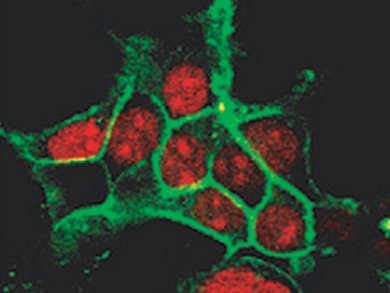Probes that investigate protein structure, function, localization, and protein–protein interactions are highly sought; especially those that reduce stress to living systems.
Kazuya Kikuchi and co-workers, Osaka University, Japan, have developed cell-permeable probes based on a clinical β-lactamase (BL-tag) prodrug. Due to the quick entry and intracellular accumulation of the probe, very low probe concentrations were required, which enabled the detection of fluorescently labeled proteins without a washing step — usually required to remove unreacted probes — thus reducing stress to living cells.

Since cell-permeable probes for intracellular protein labeling are also recognized by the target proteins on the cell surface, the group developed a way of discriminating between membrane proteins and intracellular proteins in the same cell. To perform specific labeling with a single tag, the extracellular target proteins were blocked with cell-impermeable probes (see graphic; FA-green), which then allowed the specific labeling of intracellular proteins by cell-permeable probes (RB-red). This is important for understanding protein trafficking.
- Intracellular Protein Labeling with Prodrug-Like Probes Using a Mutant β-Lactamase Ta,
S. Watanabe, S. Mizukami, Y. Akimoto, Y. Hori, K. Kikuchi,
Chem. Eur. J. 2011.
DOI: 10.1002/chem.201100973




